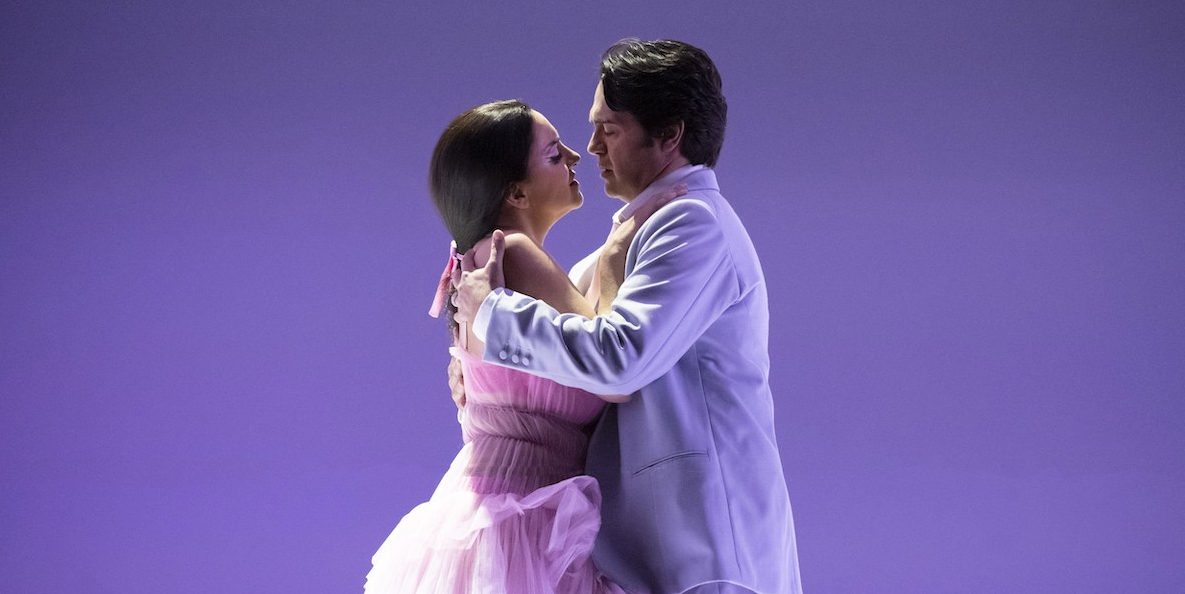Madam Butterfly is one of the most performed operas today and yet one of the most difficult to stage in a way that feels right to modern audiences. It is, of course, about a theme that is all too common today – the exploitation of young and vulnerable women by rich and powerful men. But it is hard to tolerate the portrayal of Butterfly as helpless naïve victim – or the portrayal of the Japanese as a race of fools and rogues. So it’s no surprise that Welsh National Opera has tried to give the opera a new vision that strips it of the racism and resets it in a non-specific time that allows the audience to look at its portrayal of sex and power in a fresh way. It almost works – and the musical excellence of the WNO principals, chorus,and orchestra makes the production I saw in Birmingham a memorable evening.
Butterfly is a 15 year old girl from a formerly wealthy family that has fallen on hard times. She enters into a”marriage” with Pinkerton, a rich American visiting Nagasaki. She takes the contract seriously – he makes it clear to the US consul, Sharpless, that he does not. In the course of her betrothal she rejects the traditions of her family; they are outraged and cut her off. Some time after the marriage Pinkerton leaves Japan. Three years later she is still waiting for his return, having given birth to his son. He returns, but with his “real” wife. Tragedy ensues.
The opera was first performed in 1904 composed by a Puccini at the height of his powers – but it was at first a flop. However, after revisions, it became wildly successful and made its way into the standard repertoire. Puccini was the master of lush orchestration and emotional melodies and the tragic ending of this piece rarely fails to move me to tears – this version worked that magic. The WNO’s former music director Carlo Rizzi returned to conduct and his mastery of the ebb and flow of Puccini’s sublime score was a big part of the success of the performance. The rapport between Rizzi and the WNO orchestra was palpable.
The Australian Lindy Hume directs and makes it clear that the themes of the opera are universal and contemporary. The stage design is striking – an illuminated box revolves above the stage floor, suggesting Frank Lloyd Wright rather than Hokusai. The first act costumes similarly take us to an indeterminate but modern-ish setting, though the ‘flouncy’ bridesmaid dresses worn by Butterfly’s friends strike a jarring note. Butterfly’s isolation after rejection by her family is emphasised by the hints of squalor in the second act stage setting for the home where she waits in vain for Pinkerton’s return. Greek soprano Alexia Vougaridou makes a splendid Butterfly though, as ever, the 15 year old innocent of Act 1 is a dramatic stretch. She is at her lyrical best in the final scene as she bids farewell to her son. Italian tenor Leonardo Caimi portrays, as the director demands, a particularly callous and unthinking Pinkerton but the love duet at the end of Act 1 is sublime and hints that there might be a heart beneath the arrogant exterior. Anna Harvey gives a strong and angry Suzuki and Mark Stone makes Sharpless’ weary confusion as he sees the outcome he has predicted coming true a powerful counterpoint to Suzuki’s anger.
The Welsh National Opera has emerged from the pandemic with its determination to bring the highest quality opera to a range of cities in Wales and the west. This is a production that is well sung and played – and which stimulates thought about the dramatic issues Puccini and his librettists raise. WNO deserves to fill more seats – I do hope that safer spaces for audiences will soon make that possible.

